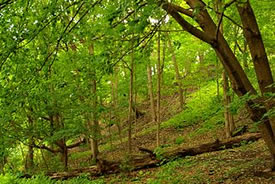Why forests matter speakers series reminds us of the value of trees

Forest by the Humber River, ON (Photo by Michael Gil, Wikimedia Commons)
I think everyone intrinsically knows that nature matters. That forests, made up of trees, literally give us life. But I also think it’s easy to forget (I, myself, am guilty of this). The Nature Conservancy of Canada (NCC) set out to remind us in their Why Forests Matter event in Toronto last April.
We heard from a multidisciplinary panel of speakers (Simon Jackson, Andrew Westoll, JP Gladu, Karen Clarke-Whistler and Dan Kraus) and I was amazed by not only how diverse their perspectives were but also by how much I already knew. Really, forests aren’t just made for pretty pictures but they matter to life, to society, to Canadians and to me!
When we think of trees, we think environment and terms like carbon dioxide, photosynthesis and oxygen. But the environmental benefits of forests are more than what we were taught in science class. The urban forest of Toronto controls storm water, removes air pollution, drastically cools temperatures and reduces energy costs saving us $80-billion per year. Which is why Karen Clarke-Whistler, chief environment officer at TD Bank Group, believes investing in green space is good for “our environment, our health, our economy and essential for future generations.”
The benefits of forests go beyond the environmental. For Andrew Westoll, author of The Chimps of Fauna Sanctuary, they also elicit wonder. During his year-long study of capuchin monkeys in Suriname, Westoll experienced "a surge of wonder that was both emotional and intellectual." I know precisely what he means because there’s nothing comparable to the effect a tree or a forest has on me. Being in the presence of a tree calms me as though the tree and I come from the same place and are made of the same stuff.
But as schedules and screens begin to increasingly dominate my life, and the lives of family and friends, I’ve seen myself become removed from the natural environment to the point where I crave distance from my wired existence. JP Gladu, president & CEO of the Canadian Council for Aboriginal Business, is all too familiar with this trend. His solution is simple: to share our nature experiences. Because it’s in the telling of our stories that we will inspire a connection in the hearts and minds of those around us. It’s really the reason why I’m here writing this.
Renewing this connection will also remind us of our role as the custodians of the forests. A role Dan Kraus, science director at the Nature Conservancy of Canada, believes not only each Canadian but also each citizen must exercise as urban sprawl continues to attack our forests. I know he’s right when he says, “the world our children will inherit depends on the decisions we make today.”
For a variety of reasons forests very much matter today. I hope through conservation we can make sure they’re still around to matter tomorrow.


